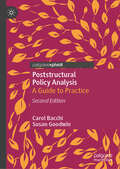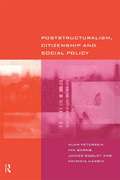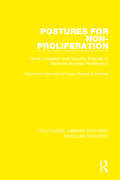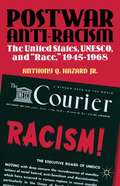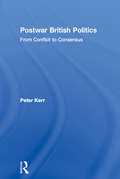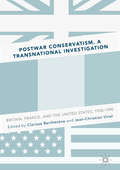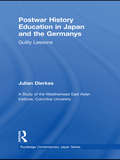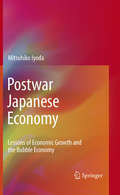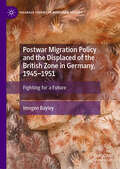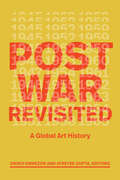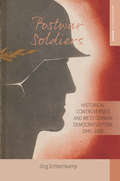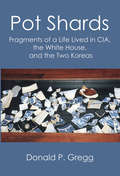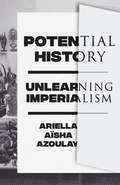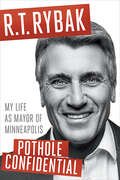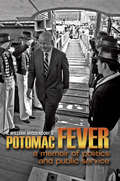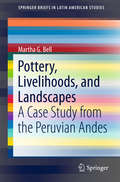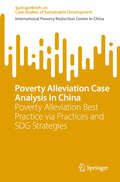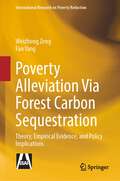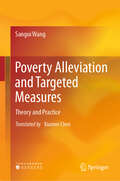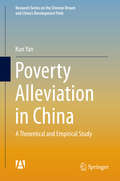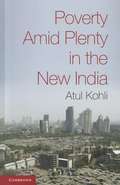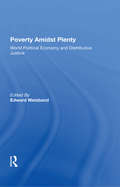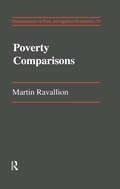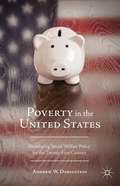- Table View
- List View
Poststructural Policy Analysis: A Guide to Practice
by Carol Bacchi Susan GoodwinThis book offers a distinctive approach to policy analysis and a refreshing and politically engaged way of thinking about policy. It clearly articulates a Foucault-influenced poststructural perspective on policy and policy analysis for researchers, students and policy makers. As a "guide to practice", the book introduces a critical analytical approach to policy analysis called &‘What&’s the Problem Represented to be?&’ (WPR). Instead of treating policy as simply the government&’s best efforts to address problems, this analytic strategy highlights how policies produce &‘problems&’ as particular sorts of problem and how governing takes place through these problematisations. First published in 2016, the book describes the conceptual and theoretical underpinnings of the WPR approach to policy analysis in a detailed and accessible manner. It features examples of application of the approach with topics as diverse as obesity, economic policy, migration, drug and alcohol policy, and gender equality. In this second edition, the authors centralise a complementary analytic strategy for poststructural policy analysis—poststructural interview analysis (PIA). This edition integrates this material as a new chapter which sets out PIA as a novel approach to poststructural interview analysis and includes examples of PIA applications. The new chapter provides excellent guidance to undertake interview analysis in a manner congruent with the poststructural precepts set out in the book.
Poststructuralism, Citizenship and Social Policy
by Patricia Harris Alan Petersen Ian Barns Janice DudleyPoststructuralism, Citizenship and Social Policy shows how poststructuralist ideas can be usefully applied in the areas of welfare, health, education and science and technology policy, making particular reference to the theme of citizenship. The impact of poststructuralism on thinking in the social sciences and humanities over the last decade has been profound. However, to date, there has been little systematic analysis of the implications of poststructuralism for the critical analysis of social policy. Poststructuralism, Citizenship and Social Policy will provide essential reading for students and researchers working in the areas of welfare studies, the sociology of health and medicine, political studies, social work, social administration and education.
Postures for Non-Proliferation: Arms Limitation and Security Policies to Minimize Nuclear Proliferation (Routledge Library Editions: Nuclear Security)
by Stockholm International Peace Research InstituteTo constrain nuclear proliferation, one must, in addition to designing a proliferation-resistant nuclear fuel cycle, identify a set of long-term arms limitation and security policies for the major states. These policies should be capable of satisfying various security and political objectives of non-nuclear weapon states, thereby minimizing their incentives to acquire independent nuclear weapon capabilities, and thus collectively minimizing future nuclear proliferation. Originally published in 1979, this book attempts to identify such a comprehensive arms limitation and security regime. It reviews negotiations concerning the NPT through the end of the Review Conference of the NPT in mid-1975 and the subsequent strategic debate concerning nuclear proliferation.
Postwar Anti-racism
by Anthony Q. HazardThis book explores the discourse and practice of anti-racism in the first two decades following World War II, uncovering the ways scientific and cultural discourses of 'race' continued to circulate in the early period of contemporary globalization through the lens on UNESCO.
Postwar British Politics: From Conflict to Consensus (Routledge/PSA Political Studies Series #No.1)
by Peter KerrThis book offers a fresh view of postwar British politics, very much at odds to the dominant view in contemporary scholarship. The author argues that postwar British politics, up to and including the Blair Government, can be largely characterised in terms of continuity and a gradual evolution from a period of conflict over the primary aims of government strategy to one of recent relative consensus. This book provides a provocative and challenging account of the historical background to the election of the Blair Government and will be of interest to a wide audience.
Postwar Conservatism, A Transnational Investigation
by Jean-Christian Vinel Clarisse BerthezèneThis volume offers a unique comparative perspective on post-war conservatism, as it traces the rise and mutations of conservative ideas in three countries - Britain, France and the United States - across a 'short' twentieth century (1929-1990) and examines the reconfiguration of conservatism as a transnational phenomenon. This framework allows for an important and distinctive point --the 1980s were less a conservative revolution than a moment when conservatism, understood in Burkean terms, was outflanked by its various satellites and political avatars, namely, populism, neoliberalism, reaction and cultural and gender traditionalism. No long running, unique 'conservative mind' comes out of this book's transnational investigation. The 1980s did not witness the ascendancy of a movement with deep roots in the 18th century reaction to the French Revolution, but rather the decline of conservatism and the rise of movements and rhetoric that had remained marginal to traditional conservatism.
Postwar History Education in Japan and the Germanys: Guilty Lessons (Routledge Contemporary Japan Series)
by Julian DierkesHow did East and West Germany and Japan reconstitute national identity after World War II? Did all three experience parallel reactions to national trauma and reconstruction? History education shaped how these nations reconceived their national identities. Because the content of history education was controlled by different actors, history education materials framed national identity in very different ways. In Japan, where the curriculum was controlled by bureaucrats bent on maintaining their purported neutrality, materials focused on the empirical building blocks of history (who? where? what?) at the expense of discussions of historical responsibility. In East Germany, where party cadres controlled the curriculum, students were taught that World War II was a capitalist aberration. In (West) Germany, where teachers controlled the curriculum, students were taught the lessons of shame and then regeneration after historians turned away from grand national narratives. This book shows that constructions of national identity are not easily malleable on the basis of moral and political concerns only, but that they are subject to institutional constraints and opportunities. In an age when post-conflict reconstruction and reconciliation has become a major focus of international policies, the analysis offers important implications for the parallel revision of portrayals of national history and the institutional reconstruction of policy-making regimes.
Postwar Japanese Economy
by Mitsuhiko IyodaSince the end of World War II, the Japanese economy has seen rapid changes and remarkable progress. It has also experienced a bubble economy and period of prolonged stagnation. The book seeks to address three major questions: What kind of changes have taken place in the postwar years? In what sense has there been progress? What lessons can be drawn from the experiences? The book is organized as follows: It begins with an overview of the postwar Japanese economy, using data to highlight historical changes. The four major economic issues in the postwar Japanese economy (economic restoration, rapid economic growth, the bubble economy and current topics) are addressed, with particular focus on the meaning of economic growth and the bubble economy. The next chapters examine the important economic issues for Japan related to a welfare-oriented society, including income distribution, asset distribution, and the relative share of income. Another chapter deals with the household structure of Japan, the pension issue, and the importance of the effect of demographic change on income distribution. The final chapter gives a brief summary, examines quality of life as a lesson of this research, and briefly outlines a proposal for a basic design towards achieving a high satisfaction level society. This book will be of interest to economists, economic historians and political scientists and would be useful as a text for any course on the Japanese economy.
Postwar Migration Policy and the Displaced of the British Zone in Germany, 1945–1951: Fighting for a Future (Palgrave Studies in Migration History)
by Imogen BayleyThis book examines the experiences of refugees who populated the Displaced Persons (DP) camps in the British Zone of Allied-occupied Germany after the Second World War. With a specific focus on Polish and Jewish communities, it explores the interaction between migration policy and the migration strategy of refugees - or in other words – the relationship between DP policy and individual choices, and how these evolved over time. The book aims to harmonize often contradictory images of displaced persons in the British Zone of occupation by taking a comparative approach and analysing conflicting identifications and state-individual relations. Drawing on the records of the International Tracing Service, refugee memoirs, DP publications distributed in the camps themselves, and personal petitions and correspondences, the author sheds light on the experiences of displaced persons and illustrates the difficulty of making clear-cut distinctions between forced and voluntary migration. Today, as in the post-war period, refugees’ access to social rights and welfare, settlement rights, and the possibility of family reunification, can all be determined by the same labels that were so fiercely contested after 1945. A dichotomy between so-called ‘economic’ and ‘political’ migration endures, and many claims to asylum are today rejected on the grounds of applicants not being formally recognized as ‘genuine’ refugees and recipients of aid. This book therefore adds to our growing understanding of the plight of refugees and the need to ensure access to justice for all through the ongoing building of an effective, accountable, and inclusive refugee regime.
Postwar Revisited: A Global Art History
by Okwui Enwezor Atreyee GuptaOkwui Enwezor’s 2016 exhibition Postwar: Art between the Pacific and the Atlantic, 1945–1965 redefined the history of art produced in those two decades. Nearly a decade later, Postwar Revisited returns to these debates to present an image of a historical period in which Western conceptions of art, aesthetics, and philosophy are all thrown into intense flux after Auschwitz and Hiroshima, while the cultural energies of decolonization generate myriad artistic and intellectual practices across the globe, which re-engage the connections of art to life itself. Focusing on modernist artists, artist collectives, and architects central to dissonant regional traditions, as well as influential exhibitions and patronage systems, the contributors produce a new understanding of emergent postwar global art. Provoking new ways of thinking, engaging, and narrating art history, Postwar Revisited is essential reading for those interested in debates on global art history and global modernism, the intersections between art and decolonization, the cultural aspects of the Cold War and the Non-Aligned Movement, and modern and contemporary art more generally.Contributors. Iftikhar Dadi, Okwui Enwezor, Patrick Flores, Hal Foster, Boris Groys, Atreyee Gupta, Elizabeth Harney, Jennifer Josten, Vivian Li, Tara McDowell, Alexandra Munroe, Nada Shabout, Terry Smith, Jenni Sorkin, Ming Tiampo
Postwar Soldiers: Historical Controversies and West German Democratization, 1945–1955 (Making Sense of History #39)
by Jörg EchternkampContemporary historians have transformed our understanding of the German military in World War II, debunking the “clean Wehrmacht” myth that held most soldiers innocent of wartime atrocities. Considerably less attention has been paid to those soldiers at the end of hostilities. In Postwar Soldiers, Jörg Echternkamp analyzes three themes in the early history of West Germany: interpretations of the war during its conclusion and the occupation period; military veteran communities’ self-perceptions; and the public rehabilitation of the image of the German soldier. As Echternkamp shows, public controversies around these topics helped to drive the social processes that legitimized the democratic postwar order.
Pot Shards: Fragments of a Life Lived in CIA, the White House, and the Two Koreas
by Donald P. Gregg“Donald Gregg’s career . . . would make a great spy novel. This autobiography makes an even better book.” —Tim Weiner, Pulitzer Prize–winning reporter and bestselling author of EnemiesPot Shards is a memoir, based on the author’s unforgettable experiences. He served as a CIA agent on the island of Saipan, during ten years in Japan, and a tour in Burma. He then spent four years tied up in the Vietnam War, two tours in Korea, the second time as ambassador, and spent ten years in the White House, where he worked for Jimmy Carter, Ronald Reagan, and George H. W. Bush.“Don Gregg is that authentic and admirable thing: a great American. He spent most of his life serving his country: in the CIA, at the White House and as a US ambassador. He has stories to tell, many of them gripping, and they are beautifully and movingly recollected here in this memoir of a splendid life.” —Christopher Buckley “A personal witness to decades of largely hidden intelligence and diplomatic history, Donald Gregg recounts his unlikely and amazing career as a CIA officer, national security advisor, and US diplomat. His adventures and insider knowledge of US relations with East Asian nations over many decades make for a lively narrative, entertaining for the general reader and useful for serious scholars alike. Through it all, Ambassador Gregg expresses a natural warmth and concern for humanity that makes his story a truly personal journey.” —Nicholas Dujmovic, PhD, CIA Staff Historian, Center for the Study of Intelligence
Potential History: Unlearning Imperialism
by Ariella AzoulayA passionately urgent call for all of us to unlearn imperialism and repair the violent world we share, from one of our most compelling political theoristsIn this theoretical tour-de-force, renowned scholar Ariella Aïsha Azoulay calls on us to recognize the imperial foundations of knowledge and to refuse its strictures and its many violences.Azoulay argues that the institutions that make our world, from archives and museums to ideas of sovereignty and human rights to history itself, are all dependent on imperial modes of thinking. Imperialism has segmented populations into differentially governed groups, continually emphasized the possibility of progress while it tries to destroy what came before, and voraciously seeks out the new by sealing the past away in dusty archival boxes and the glass vitrines of museums.By practicing what she calls potential history, Azoulay argues that we can still refuse the original imperial violence that shattered communities, lives, and worlds, from native peoples in the Americas at the moment of conquest to the Congo ruled by Belgium's brutal King Léopold II, from dispossessed Palestinians in 1948 to displaced refugees in our own day. In Potential History, Azoulay travels alongside historical companions—an old Palestinian man who refused to leave his village in 1948, an anonymous woman in war-ravaged Berlin, looted objects and documents torn from their worlds and now housed in archives and museums—to chart the ways imperialism has sought to order time, space, and politics. Rather than looking for a new future, Azoulay calls upon us to rewind history and unlearn our imperial rights, to continue to refuse imperial violence by making present what was invented as &“past&” and making the repair of torn worlds the substance of politics.
Pothole Confidential: My Life as Mayor of Minneapolis
by R.T. RybakA pajama party at the Minneapolis–St. Paul International Airport inadvertently helped launch R.T. Rybak&’s political career (imagine a rumba line one hundred protesters long chanting, &“We deserve to sleep, hey!&”), but his earliest lessons in leadership occurred during his childhood. Growing up in a middle-class neighborhood, attending private school with students who had much more than he did, spending evenings at his family&’s store in an area where people lived with much less, he witnessed firsthand the opportunity and injustice of the city he called home. In a memoir that is at once a political coming-of-age story and a behind-the-scenes look at the running of a great city, the three-term mayor takes readers into the highs and lows and the daily drama of a life inextricably linked with Minneapolis over the past fifty years. With refreshing candor and insight, Rybak describes his path through journalism, marketing, and community activism that led to his unlikely (to him, at least) primary election—on September 11, 2001. His personal account of the challenges and crises confronting the city over twelve years, including the tragic collapse of the I-35W bridge, the rising scourge of youth violence, and the bruising fight over a ban on gay marriage (with Rybak himself conducting the first such ceremony at City Hall on August 1, 2013), is also an illuminating, often funny depiction of learning the workings of the job, frequently on the fly, while trying to keep up with his most important constituency, his family. As bracing as the &“fresh air&” campaign that swept him into office, Rybak&’s memoir is that rare document from a politician: one more concerned with the people he served and the issues of his time than with burnishing his own credentials. As such, it reflects what leadership truly looks like.
Potomac Fever
by William J. Middendorf IIAfter a highly successful career in investment banking with his own firm and a seat on the New York Stock Exchange, J. William Middendorf became restive and looked for new challenges. Having "learned how to make money," he writes in this memoir, he "wanted to learn how to make a difference." Thus he became actively involved in politics, first at the local level in Connecticut and then with the presidential campaign of Senator Barry Goldwater in 1964 and as treasurer of the Republican National Committee. There followed a series of challenging public service appointments: ambassador to the Netherlands, Under Secretary and later Secretary of the Navy, ambassador to the Organization of American States, and ambassador to the European Community.Middendorf is a first-rate storyteller and has many tales to share--from his World War II Navy service, to his first job wearing a string of pearls in a bank vault, to a failed effort to bring a U.S.-style constitution to post-Soviet Russia. He recounts tales of villains and heroes, of narrow legislative victories on vital programs, of efforts to forestall war in the Falklands and to counter growing Communist control of the island of Grenada, as well as how the Navy won narrow but vital victories on such important programs as the Aegis missile system and the Trident submarine. Writing with the authority of someone who held a number of key government positions, his lively and revealing memoir is filled with many behind-the-scenes stories of critical events of the Cold War.
Pottery, Livelihoods, and Landscapes
by Martha G. BellThis book describes the pottery trade activities of the residents of the community of San Bartolom#65533; de los Olleros in Piura, Peru. Based on extensive interviews with potters and traders, it explains why the barter of pots continues to be practiced, and explores how pottery production and exchange practices may now be changing. The book provides a unique and detailed analysis of the interconnections between handicraft production, rural trade networks, and agriculture in an Andean context. Pots are mainly bartered for food crops within a non-monetary peasant economy distinct from the "conventional" market. This practice is an important food source for pottery traders; thus trader livelihoods are placed at the center of this qualitative study of pottery distribution. Of primary importance are: 1) the decision-making processes surrounding exchange activities, 2) how exchange choices produce distinct spatial patterns, and 3) how the marketing of pots impacts livelihoods.
Poverty Alleviation Case Analysis In China: Poverty Alleviation Best Practice via Practices and SDG Strategies (SpringerBriefs on Case Studies of Sustainable Development)
by Intl Poverty Reduction Center In ChinaThis book offers comprehensive analysis for individual cases of poverty alleviation to facilitate respective in-depth key learnings and an overview of poverty alleviation strategies carried out in China. Best practices were selected from representative cases in China to demonstrate the development of different approaches in the poverty alleviation journey with collective stakeholders’ efforts – Government, Industry, Academia, and Research, plus the local stakeholders engaged in the rural development activities. Overseas cases are referenced to show the outcome of similar strategies as comparison with the consideration of regional specific conditions. Through better understanding of the focal issues, areas and organizations – and their respective key challenges and solutions – there is the compilation for each case its analysis, comparative studies and SDG relevance. These aim at engaging the readers from institutes, governments, corporates, or social enterprises, to think about how to adopt the related SDG strategies. They also serve as the initiatives to facilitate potential cross-region and cross-disciplinary collaboration. The book acts as the guide on how: - Poverty Reduction is one of the key goals in SDGs – while solving this key challenge, multiple goals could be planned and tackled together to make an effective solution. - Multi-disciplinary strategies are put in place, demonstrated via success stories and best practices. Key driving factors are identified with the consideration of the driving organization nature. - A system could be developed to engage different stakeholders in the society for industry development – and to avoid returning to poverty in the long term. - Future international cooperation could be facilitated to create a poverty alleviation framework applicable across different regions.
Poverty Alleviation Via Forest Carbon Sequestration: Theory, Empirical Evidence, and Policy Implications (International Research on Poverty Reduction)
by Fan Yang Weizhong ZengThis book focuses on two issues: the creation of benefits and opportunities for the poverty-stricken people and the trade-off between FCS and poverty alleviation. At the theoretical level, it explains the essential characteristics of PAFCS, analyses the impact mechanism of FCS projects in poverty alleviation, clarifies the stakeholders and their interests and demands, and delineates the dynamic mechanism of FCS projects and poverty alleviation. Based on this theoretical framework, the current situation and challenges for PAFCS in southwest China's ethnic areas are examined in depth. Project performance was quantitatively measured both for projects themselves and for community farmers. The research emphasises that FCS projects in poverty-stricken areas are not the same as PAFCS, highlights the combination of poverty alleviation theory and ecological compensation theory, and considers PAFCS as an intersection of poverty research and ecological compensation research. Additionally, theresearch suggested that FCS projects are not general poverty alleviation projects, highlights the need for full respect to be granted to the subjective will and value judgement of farmers, including poverty-stricken farmers, takes the lead in focusing on the win–win goal of combating climate change and reducing poverty, and makes a breakthrough in researching some key issues that need to be solved in the practice of PAFCS in the ethnic areas of Southwest China. This book is helpful for global scholars in the field of sustainable development, anti-poverty and forest carbon sequestration, government officials, and organisations in developing countries concerned with agricultural development, forestry economy, and sustainable development, as well as all the people around the world who want to find innovative solutions in the climate negotiations.
Poverty Alleviation and Targeted Measures: Theory and Practice
by Sangui WangThis book examines China’s remarkable success in reducing poverty the largest and most significant effort of poverty alleviation in human history. It begins by outlining the background of poverty alleviation in China, systematically analyzing its organizational and policy frameworks, and detailing the implementation models and pathways of targeted poverty alleviation. Next, it addresses the challenges and practices associated with poverty alleviation in China, summarizing the experiences that illustrate not only significant achievements in poverty reduction but also far-reaching political, social, and international implications. Finally, at a pivotal moment in the CPC’s pursuit of its second centenary goal, the book connects poverty alleviation with rural revitalization, which is essential for the next phase of agricultural and rural development in China. It offers a forward-looking analysis of relative poverty alleviation and proposes specific strategies to address these challenges.
Poverty Alleviation in China
by Kun YanThis study systematically investigates the development process, major characteristics and weak links of China's poverty alleviation experience and conducts a comparative analysis of poverty alleviation cases. It also accurately presents the internal logic and core elements of China's poverty alleviation theory and taking the Chinese experience of poverty alleviation refines the "Two Threads One Force" theoretical framework to make a basic judgment of the "China model" for poverty alleviation. It also presents the rationale and plans for responding to new challenges to achieve poverty alleviation goals, which will enhance the welfare of the people and promote social progress and national prosperity.
Poverty Amid Plenty in the New India
by Atul KohliIndia has one of the fastest growing economies on earth. Over the past three decades, socialism has been replaced by pro-business policies as the way forward. And yet, in this 'new' India, grinding poverty is still a feature of everyday life. Some 450 million people subsist on less than $1.25 per day and nearly half of India's children are malnourished. In his latest book, Atul Kohli, a seasoned scholar of Indian politics and economics, blames this discrepancy on the narrow nature of the ruling alliance in India that, in its new-found relationship with business, has prioritized economic growth above all other social and political considerations. This thoughtful and challenging book affords an alternative vision of India's rise in the world that its democratic rulers will be forced to come to grips with in the years ahead.
Poverty Amidst Plenty: World Political Economy And Distributive Justice
by Edward WeisbandEdward Weisband's pioneering text is destined to transform the current teaching of world political economy at both the introductory and the advanced level. Outlining the moral principles and ethical concepts fundamental to grasping the human significance of poverty, he clearly reveals what is often hinted at but rarely stated–that the political dimensions of poverty and distributive justice constitute the organizing framework of the study of world political economy. Against a backdrop of readings, Professor Weisband's insightful, interpretative essays generate an interdisciplinary discussion, a synthesis of theoretical perspectives and value orientations, providing students with a critical comprehension of the complex workings of the world economy. The essays link basic approaches to world politics and international relations, international law and organization, international sociology, development studies, and moral philosophy to give texture to such basic theories as modes of production, dependency, world systems, unequal exchange, the labor theory of value, free-trade liberalism, neomercantilism, Marxism, and neo-Marxism. Alternative value orientations are also explored, including realist and neo-realist, conservative and liberal, egalitarian and cosmopolitan, radical and materialist. Poverty Amidst Plenty combines theory and analysis with historical and normative perspectives to offer students a relevant, prescriptive, and most of all, human picture of the far-reaching system that governs much of our lives.
Poverty Comparisons: A Guide To Concepts And Methods (Living Standards Measurement Study Working Papers #No. 88)
by Martin RavallionFirst published in 1994. Routledge is an imprint of Taylor & Francis, an informa company.
Poverty In The United States
by Andrew W. DobelsteinThis book attributes American poverty to consequences 19th Century social welfare policies within an economy stretching to meet its 21st Century economic potential, arguing that American poverty persists as economic and political structures have moved into the world of fiscal planning but social welfare remains in its Depression-era structure.
Poverty Knowledge in South Africa
by Grace DaviePoverty is South Africa's greatest challenge. But what is "poverty"? And how can it be measured and addressed? In South Africa, human-science knowledge about the cost of living grew out of colonialism, industrialization, apartheid, and civil resistance campaigns, which makes this knowledge far from neutral or apolitical. South Africans have used the Poverty Datum Line (PDL), and other poverty indicators, to petition the state, to chip away at the pillars of white supremacy, and, more recently, to criticize the postapartheid government's failures to deliver on its promises. Rather than advocating one particular policy solution, this book argues that poverty knowledge - including knowledge of the tension between quantitative and qualitative observations - teaches us about the dynamics of historical change, the power of racial thinking in white settler societies, and the role of ordinary people in shaping state policy. Readers will gain new perspectives on today's debates about social welfare, redistribution, and human rights and will ultimately find reasons to rethink conventional approaches to advocacy.
